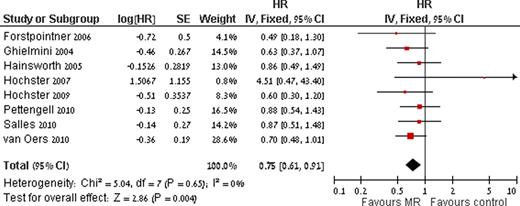Abstract
Abstract 1798
Rituximab maintenance for the treatment of patients with follicular lymphoma: systematic review and meta-analysis of randomized trials - 2010 update.
Liat Vidal, Anat Gafter-Gvili, Gilles Salles, Martin Dreyling, Michele Ghielmini, Shu-Fang Hsu Schmitz, Ruth Pettengell, Mathias Witsenz-Harig, Ofer Shpilberg.
Follicular lymphoma (FL) is characterized by slow growth and an initially high rate of response to treatment, but patients typically relapse and experience progressive disease. Rituximab in combination with chemotherapy has been shown to improve overall survival (OS) in patients with FL compared with chemotherapy alone. In order to evaluate the effect of maintenance treatment with rituximab on the OS of patients with FL we performed a systematic review and meta-analysis in 2007. Updated results from these studies and new clinical trials are reported here. Methods: A systematic review and meta-analysis of randomized controlled trials that compared rituximab maintenance therapy with observation or treatment at relapse (no maintenance therapy). In June 2010 we updated our 2007 search in The Cochrane Library, MEDLINE, LILACS, conference proceedings, and databases of ongoing trials. Two reviewers independently assessed the quality of the trials and extracted data. HRs for time-to-event data were estimated and pooled. Results: The search in 2007 identified five eligible trials including 1143 adult patients. The results of the meta-analysis of 985 patients with FL were previously reported. The present search identified six additional included trials; three of them had no current available outcome data. Three of the trials that were included in our first report had long term outcomes that were available for the current meta-analysis. Patients treated with maintenance rituximab had statistically significant better OS compared to patients in the observation arm or patients treated at relapse (HR for death 0.75, 95% confidence interval (CI) 0.61 to 0.91, 2283 patients, Figure). Patients with refractory or relapsed (i.e., previously treated) FL had a significant survival benefit with maintenance rituximab therapy (HR for death 0.72, 95% CI 0.57 to 0.91, 909 patients), whereas previously untreated patients did not (HR for death 0.83, 95% CI 0.56 to 1.23, 1374 patients). Progression free survival was improved in each of the included trials, pooled HR 0.54 95% CI 0.48 to 0.61, n=2283. This effect was consistent both in patients who received rituximab maintenance after their first induction therapy (HR 0.53, 95% CI 0.44 to 0.63, n=1374), and in those who received maintenance rituximab after two or more inductions (HR 0.63, 95% CI 0.50 to 0.79, n=804), and following different induction therapies: rituximab alone (HR 0.54, 95% CI 0.40 to 0.73, n=240), chemotherapy alone (HR 0.49, 95% CI 0.37 to 0.66, n=308), and rituximab-chemotherapy (HR 0.58, 95% CI 0.48 to 0.70, n=1352).
The rate of infection-related adverse events was higher with rituximab maintenance treatment (Risk ratio (RR) 1.99, 95% CI 1.21 to 3.27). The rate of grade 3/4 adverse events was higher with rituximab maintenance (RR 1.47 95% CI 1.19 to 1.83). Conclusions: Rituximab maintenance improves OS and disease control in patients with FL after a successful induction therapy. The accumulating data from new and updated clinical trials did not change the results of our former meta-analysis. While a clear survival benefit is shown only for patients with relapsed or refractory FL, progression free survival is improved after first induction as well as after two or more inductions.
Pooled estimates of overall survival with rituximab maintenance therapy for patients with follicular lymphoma compared with observation or rituximab at disease progression.
Pooled estimates of overall survival with rituximab maintenance therapy for patients with follicular lymphoma compared with observation or rituximab at disease progression.
Salles:Roche: Honoraria. Dreyling:Roche: . Ghielmini:Roche: Consultancy. Pettengell:Roche: Consultancy, Honoraria. Shpilberg:Roche: Consultancy.
Author notes
Asterisk with author names denotes non-ASH members.


This feature is available to Subscribers Only
Sign In or Create an Account Close Modal